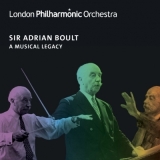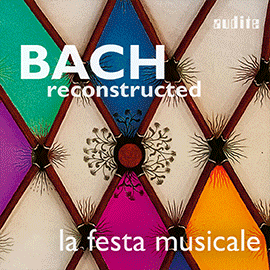 A Musical Legacy; Arnold Concerto for Organ and Orchestra; Bartok: Music for Strings, percussion and Celesta; Bax: The Garden of Fand; Beethoven: Symphonie Nr. 3 (Eroica); Bruch Kol: Nidrei; Butterworth: A Shropshire Lad; Clarke Suite in D Major; Delibes: Sylvia & Naïla & Coppélia Ballet Suites; Dohnanyi Variations on a Nursery Song; Elgar: Symphony No. 1 + In the South, Alassio; De Falla: Fire Dance from el Amor Brujo; Gershwin: Cuban Overture; Holst: The Perfect Fool Ballet Suite; Saint-Saëns: Danse Macabre + Caprice-Valse, Wedding Cake; Sibelius: Lemminkäinen's Return; Stanford: Songs of the Fleet; Stravinsky: Circus Polka; Vaughan Williams: Symphony No. 6 + The Lark Ascending; Walton: Portsmouth Point Overture; Wolf-Ferrari: I gioielli della Madonna Suite No. 2; Patricia Bishop, Klavier, Jean Pougnet, Violine, Gwenneth Pryor, Klavier, Frederick Harvey, Bariton, Croydon Philharmonic Society (Stanford), London Philharmonic Orchestra, Adrian Boult; 5 CDs LPO 0119; Aufnahmen 1949-1969, Veröffentlichung 12/2020 (390') - Rezension von Remy Franck
A Musical Legacy; Arnold Concerto for Organ and Orchestra; Bartok: Music for Strings, percussion and Celesta; Bax: The Garden of Fand; Beethoven: Symphonie Nr. 3 (Eroica); Bruch Kol: Nidrei; Butterworth: A Shropshire Lad; Clarke Suite in D Major; Delibes: Sylvia & Naïla & Coppélia Ballet Suites; Dohnanyi Variations on a Nursery Song; Elgar: Symphony No. 1 + In the South, Alassio; De Falla: Fire Dance from el Amor Brujo; Gershwin: Cuban Overture; Holst: The Perfect Fool Ballet Suite; Saint-Saëns: Danse Macabre + Caprice-Valse, Wedding Cake; Sibelius: Lemminkäinen's Return; Stanford: Songs of the Fleet; Stravinsky: Circus Polka; Vaughan Williams: Symphony No. 6 + The Lark Ascending; Walton: Portsmouth Point Overture; Wolf-Ferrari: I gioielli della Madonna Suite No. 2; Patricia Bishop, Klavier, Jean Pougnet, Violine, Gwenneth Pryor, Klavier, Frederick Harvey, Bariton, Croydon Philharmonic Society (Stanford), London Philharmonic Orchestra, Adrian Boult; 5 CDs LPO 0119; Aufnahmen 1949-1969, Veröffentlichung 12/2020 (390') - Rezension von Remy Franck

Adrian Boult (1889-1983) hat sich ein Leben lang mit Elgar beschäftigt und gilt als ‘the Elgarian’ schlechthin. Er hat Elgar in den Vierzigerjahren, in den Sechzigern und noch einmal 1976 aufgenommen. Mit unterschiedlichem Ergebnis. Mit dem Alter nahmen Leidenschaft und Kraft ab, Raffinement und Nuancierungskraft nahmen zu. Das LPO hat in dieser Hommage an Boult die Aufnahme von 1949 ausgewählt, die als einer der besten gilt, die je von diesem Werk gemacht wurde. Sie hat Grandeur und Noblesse und muss als genuiner Elgar angesehen werden. Sie ist so etwas wie die Basis, das Fundament, auf der alle Elgar-Interpretationen aufbauen.
Boults sehr britischer Stil zeigt auch Ralph Vaughan Williams anhand seiner 6. Symphonie (1953 aufgenommen) als einen großartigen englischen Komponisten mit dem dazugehörigen, typisch grandiosen Sound.
Die zweite CD enthält die Aufnahme der Eroica von 1957, undramatisch, klassisch und eher rückwärtsgewandt, fein ausgewogen und sehr transparent. Eine gefühlvolle Interpretation von Bruchs Kol Nidrei und eine dramatische Version von Dohnanyis Variationen über ein Kinderlied komplettieren diese CD. Die dritte trägt den Titel Music from the Ballet und die vierte heißt The Versatile Conductor. Sie geben dem Herausgeber die Gelegenheit, eine Vielzahl an kleineren Stücken zu vereinen (siehe oben), die Boult als einen eklektischen Dirigenten zeigen, der auch – darin Karajan nicht unähnlich – der populäreren Musik viel Sorgfalt zukommen und sie auf hohem spieltechnischem Niveau aufführen ließ. Dabei muss man sagen, dass ihm, wie die Ballette von Delibes zeigen, die französische Eleganz nicht so liegt wie Karajan…
Ganz in seinem Element ist Boult auf der 5. CD, Champion of British Music, die mit den selten aufgeführten Songs of the Fleet von Charles Villiers Stanford beginnt und auch Malcolm Arnolds ebenfalls nicht besonders populäres Orgelkonzert präsentiert.
Die Aufnahmequalität ist unterschiedlich, die frühen Monoaufnahmen sind nicht besonders gut.
Adrian Boult (1889-1983) spent his whole life working on Elgar’s music and is regarded as ‘the Elgarian’ par excellence. He recorded Elgar in the forties, the sixties and again in 1976. With varying results. As he grew older, passion and power diminished, refinement and nuance increased. In this homage to Boult, the LPO has chosen the 1949 recording, considered one of the best ever made of this work. It has grandeur and noblesse and must be considered a genuine Elgar. It is something like the basis, the foundation upon which all Elgar interpretations are built.
Boult’s very British style also shows Ralph Vaughan Williams on the basis of his 6th Symphony (recorded in 1953) as a great English composer with the typically grandiose sound that goes with it.
The second CD contains the recording of the Eroica from 1957, undramatic, classical and rather backward-looking, finely balanced and very transparent. A soulful interpretation of Bruch’s Kol Nidrei and a dramatic version of Dohnanyi’s Variations on a Children’s Song complete this CD. The third is entitled Music from the Ballet and the fourth is called The Versatile Conductor. They give the editor the opportunity to compile a large number of smaller pieces (see above), which show Boult as an eclectic conductor who – not unlike Karajan – gave much care to the more popular music and had it performed at a high technical level. It has to be said that, as the ballets of Delibes show, French elegance does not suit Boult as well as Karajan…
Boult is completely in his element on the 5th CD, Champion of British Music, which begins with the rarely performed Songs of the Fleet by Charles Villiers Stanford and also presents Malcolm Arnold’s likewise not very popular organ concerto.
The recording quality varies, the early mono recordings are not particularly good.





















